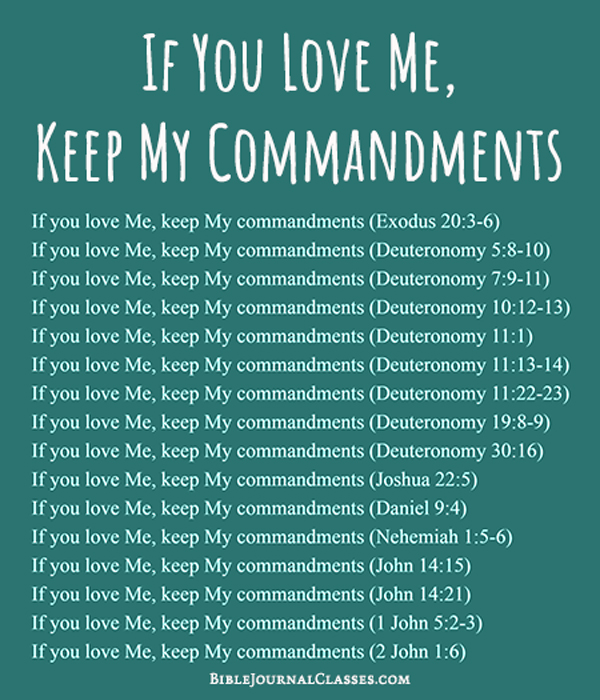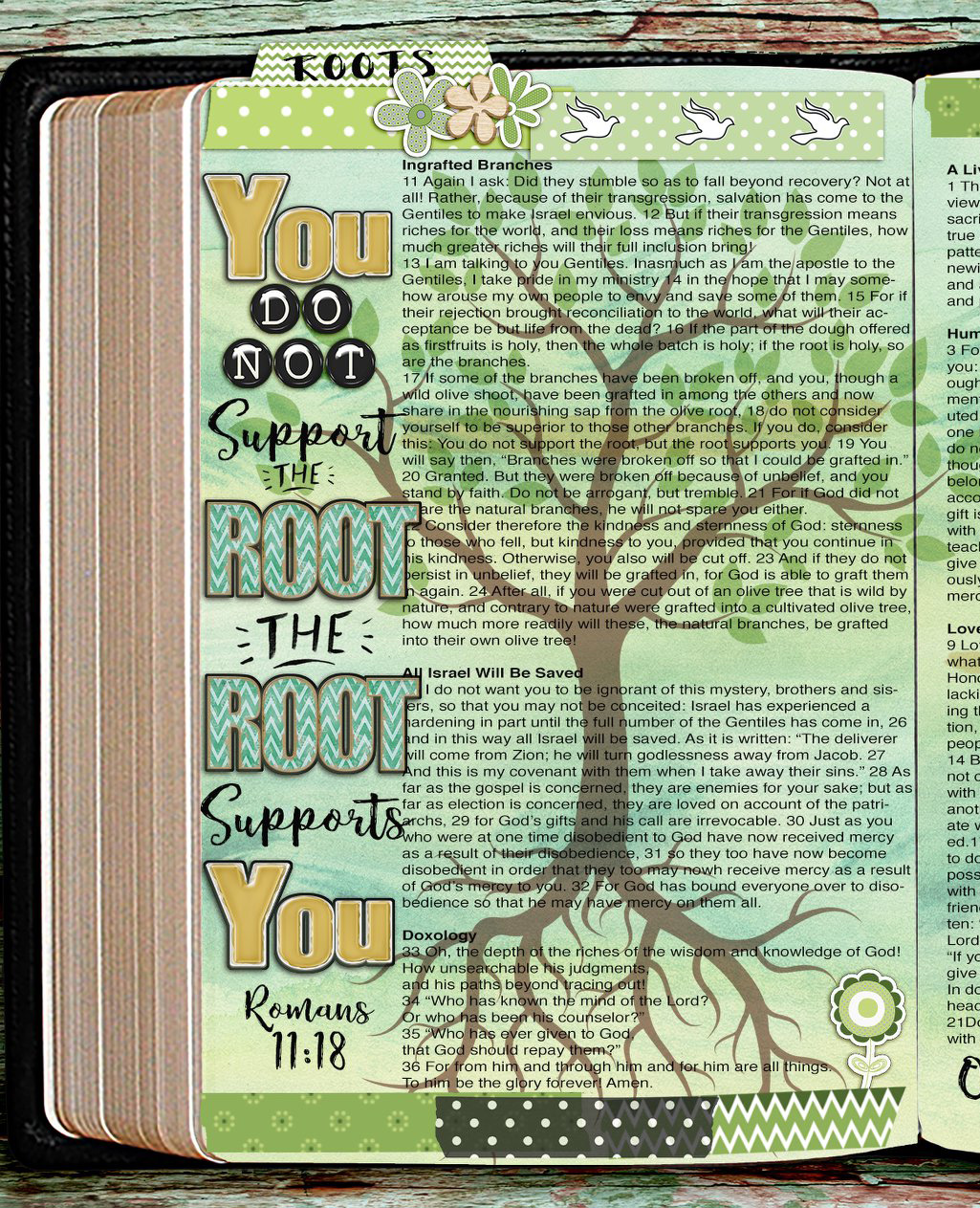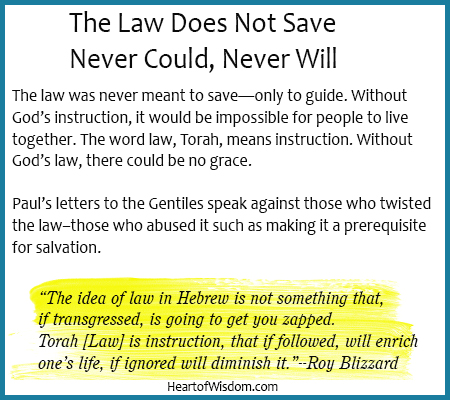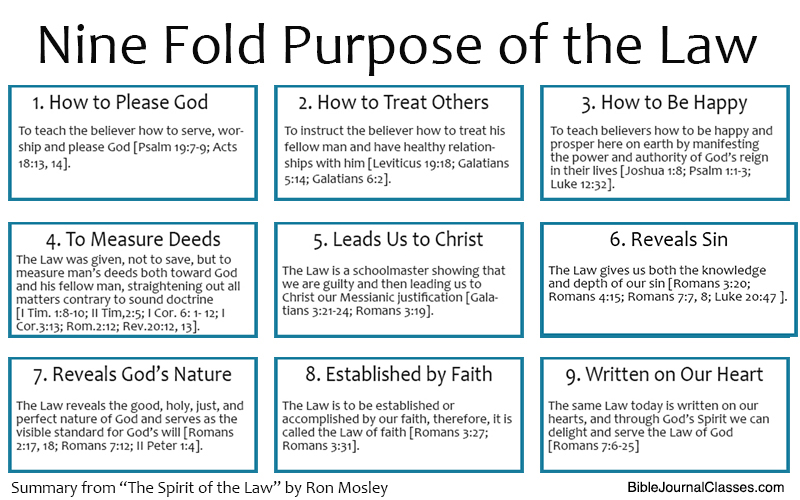
Christians usually don't like the word "law" because they think it means strict and pointless rules. But Torah, the word we use to mean "law," has a very different meaning and focus in Hebrew. Torah comes from the root word yarah, which means "to flow like water." Figuratively, it means to show, teach, tell, inform, or point out. A better translation is the word instruction.
Just as loving parents establish rules and boundaries to protect, guide, and nurture their children, God, our Heavenly Father, provides us with commandments to ensure our spiritual well-being and to help us lead fulfilling lives.
(Download a free Biblical Holidays Excerpt at the bottom of this post)
Instruction
Torah means "instruction" in English, which means "God's instruction to man." Whatever God teaches us, we must follow to enjoy a good life here on earth. Torah reminds us that God is not just a lawmaker or a police officer ready to punish us. God is also a loving parent who teaches His children how to live. Jesus was just reflecting His Father when He taught His disciples and the people how to have life and have it more abundantly.

No One Can Keep the Law
No one, no matter how many or how few, can properly keep all the laws (Ecclesiastes 7:20; Romans 3:23). In truth, no one can keep all ten commandments properly. The Law exposes our wickedness (Romans 7:7). The Law was given by God to identify sin and highlight our need for a Savior. The only person who has perfectly obeyed the Law is Jesus. He fulfilled all of God's righteous commands via His life, death, and resurrection.
A Stream of Water
We should view God's law as a source of wisdom and learning, an invitation to grow and flourish under His direction, much like a plant thriving by a stream of water.
In Hebrew, 'Torah' comes from the root word 'yarah,' which intriguingly means "to flow like water." This imagery is far removed from the rigid connotations often associated with the word 'law.' Instead, it suggests something more organic, dynamic, and life-giving. 'Torah' encompasses showing, teaching, informing, and pointing - it is a guiding principle rather than a set of restrictive rules.
Thus, a more accurate translation of 'Torah' might be 'instruction' rather than 'law.' This shift in understanding transforms the perception of God's law from a list of do's and don'ts into a form of divine guidance, akin to a flowing stream that nurtures and directs rather than confines.

The Law is Eternal
Jesus explained the law is eternal. Our Torah continues to be a source of guidance, direction, and instruction for people of faith.
“Do not think that I have come to abolish the Law or the Prophets;
I have not come to abolish them but to fulfill them.
For truly, I say to you, until heaven and earth pass away,
not an iota, not a dot, will pass from the Law until all is accomplished.
Matthew 5:17-18
Not only did Jesus fulfill the law, but the law will remain unchanged until heaven and earth disappear (i.e., until the end of the era). Not even the slightest detail, not even the smallest stroke of a pen, shall be spared from God's law. The statement of Jesus confirms the full authority of every word and letter of Scripture.
613 Laws
God gave 613 commandments to show us how to live here on earth. The Ten Commandments are the first ten of the 613 commandments. God gave the Law to disclose His standard of absolute righteousness, to convince us all of our true sin before Him, and to show us the need for the gospel.
There are many different laws in the Bible. The law of sin and death was nailed to the cross. The laws dealing with sacrifices were only for the Temple period.
The New Testament verses concerning God’s law explain that those who love God will follow God’s instructions—His ways, His paths (Romans 2:23; Ephesians 6:2-3; Exodus 20:12; Deuteronomy 5:16; Hebrews 10:16; James 1:25; 2:11; 8-26; 1 John 2:3-4, 24; 3:22; 5:2,3; 2 John 6; Revelation 22:14).
The Law is Written on Our Hearts

I will put my law in their minds and write it on their hearts. I will be their God, and they will be my people. Jeremiah 31:33
On Mount Sinai, God gave his people the Torah covenant. On the Feast of Pentecost, Christ sent his Spirit to seal a new covenant of sin-forgiveness. The Spirit, like the Torah, reveals God's truth, instructs us, and convicts us of sin. However, unlike the Torah, the Spirit enables us to live in communion with God by changing our hearts from within, which the law could not do (Romans 8:5-7).
Summary of the Law
Jesus said the most important commands are summed up in loving the Lord your God with all your heart and loving your neighbor as yourself. He didn’t say the entire Law was replaced by loving God and your neighbor. He literally meant it as a summary- the main idea. Just as the summary of Constitution of the USA is the right to life, liberty, and the pursuit of happiness, but is does not actually replace the entire Constitution nor the amendments.

The Intention of the Law
The intention of laws is to bring holiness to God’s people. “And the Lord spoke unto Moses and said, ‘Speak to all the congregation of the children of Israel and say to them; You shall be holy, for I the Lord you God am holy.’”
God established moral and ceremonial regulations to assist people in loving him with all of their hearts and minds. However, by Jesus' time, religious leaders had twisted God's laws into a jumbled mess of rules. When Jesus spoke about a new way to comprehend the law, he was attempting to return people to its original purpose. Jesus did not criticize the law in and of itself, but rather the abuses and excesses to which it had been subjected.
Under the Law of Christ
Jesus became the ultimate sacrifice–no more sacrifices are needed (Hebrews 8). The Old Testament law has not been repealed, but it must now be reinterpreted and used in light of Jesus. God never changes his mind.
We are not without the law but under “the law of Christ” (Gal. 6:2). There are laws that apply to believers today that deal with our relationships with other people. The law is good and just and perfect–there is a problem with the law–there is a problem with man. Man, with his sin nature, is unable to keep the law.
Freedom is not absence of law; absence of law is anarchy.
The law was never meant to save—only to guide. Without God’s instruction, it would be impossible for people to live together. Without God’s law, there could be no grace.
As David said in Psalm 119, God laid down precepts that are to be obeyed. He said he meditated on God’s precepts and ways, and if we walk in God’s paths our hearts are set free.
The Law is Never Earning Salvation
The Jews never believed that anyone could earn their way to salvation. They know salvation is only by grace through Messiah (and we are praying they will have their eyes opened to see the Y’shua (Jesus) is the Messiah). Neither Jesus nor Paul ever taught God’s law was “done away with.”
Obedience to God's Law was a show of trust in God, and only those who offered such to God were truly His people.
Paul’s letters to the Gentiles speak against upset with those who twisted the law–those who abused it such as making it a prerequisite for salvation. Paul made it clear the Gentiles did not have to live by the law to attain salvation. He did encourage the Jewish believers to keep the law–but never made it a condition of salvation. Paul never implied that believers in Christ were to start a “new religion” that did away with the Old Testament.
In fact, Paul explains we should thank God for His mercy that by faith we are grafted into Israel and we are not to boast for their eyes are blinded, in part, until the fullness of the Gentiles– see Romans 11:16-36.

We are under a new covenant but we still have the same King and His Word says obedience is better than sacrifice. The law exposes sin, measures man, and actually shows us how full of mercy God is. Luther, Wesley, Spurgeon, Finney, Moody and other Christian leaders all taught the importance of God’s law.
Did Grace Replace the Law?
The idea that grace replaced the law began in the second century. The first section of this book explains how the Early Church left their Hebraic roots. During the second century, Marcion, a heretic who twisted Paul’s writings, caused a radical opposition between the Law and the Gospels.

Marcion suggested the entire Old Testament be omitted from the cannon. He broke away from the Roman church in 144 and set up his own very successful group. Polycarp referred to Marcion as the Son of Satan. Marcion believed the God described in the Old Testament was cruel, so he refused to acknowledge the God of the Old Testament but embraced the portions of the New Testament that expressed God’s love.
Marcion created a reduced version of the New Testament consisting of Luke and parts of Paul’s letters–purposely leaving out all Jewish interpolations. Marcion’s legacy lives on. A study of Marcion and his immense influence on Christian leaders in church history is highly advisable to anyone serious about studying God’s law.
Roy Blizzard summed up the law, as it is used in the Bible, in these two sentences:
“The idea of law in Hebrew is not something that, if transgressed, is going to get you zapped. Torah [Law] is instruction, that if followed, will enrich one’s life, if ignored will diminish it.”

Nine-Fold Purpose of the Law

- To teach the believer how to serve, worship and please God [Psalm 19:7-9; Acts 18:13, 14].
- To instruct the believer how to treat his fellow man and have healthy relationships with him [Leviticus 19:18; Galatians 5:14; Galatians 6:2].
- To teach believers how to be happy and prosper here on earth by manifesting the power and authority of God’s reign in their lives [Joshua 1:8; Psalm 1:1-3; Luke 12:32].
- The Law was given, not to save, but to measure man’s deeds both toward God and his fellow man, straightening out all matters contrary to sound doctrine [I Timothy 1:8-10; II Timothy 2:5; I Corinthians 6: 1- 12; I Corinthians 3:13; Romans 2:12; Revelation 20:12, 13].
- The Law is a schoolmaster showing that we are guilty and then leading us to Christ our Messianic justification [Galatians 3:21-24; Romans 3:19].
- The Law gives us both the knowledge and depth of our sin [Romans 3:20; Romans 4:15; Romans 7:7, 8; Luke 20:47 - greater damnation].
- The Law reveals the good, holy, just, and perfect nature of God and serves as the visible standard for God’s will [Romans 2:17, 18; Romans 7:12; II Peter 1:4].
- The Law is to be established or accomplished by our faith, therefore, it is called the Law of faith [Romans 3:27; Romans 3:31].
- The same Law today is written on our hearts, and through God’s Spirit we can delight and serve the Law of God [Romans 7:6-25] (Mosley 1996).

I rejoice in following your statutes as one rejoices in great riches. I
meditate on your precepts and consider your ways. Psalm 119:14
We fulfill the law when we love one another and God, and God rejoices over us! So, by all means, let us "Rejoice in the Law" alongside Israel. It is part of our inheritance in Jesus, and doing so is consistent with New Testament teaching and acknowledges the loving heavenly Father who gave us the law.
 A Family Guide to the Biblical Holidays
A Family Guide to the Biblical Holidays
The symbolism in the Bible is an absorbing subject! This book reveals Jesus’s death, burial, and resurrection, all foretold in the Spring holidays, and find out how to recognize His second coming by learning about the Fall holidays! This giant, 585 page telephone-size book gives an an extensive look at the nine annual holidays: Passover, Unleavened Bread, Firstfruits, Pentecost, Trumpets, Day of Atonement, Tabernacles, Hanukkah, Purim and the weekly holiday–the Sabbath!
“In 34 years of publishing Messianic Catalogs we have never seen such a creative contribution to the body of Messiah …” Manny and Sandra Brotman, founder of The Messianic Jewish Movement International
Having this book at your fingertips is like having a library on the Bible holidays!
Dr. Marvin Wilson, Professor and Chairman of Biblical and Theological Studies at Gordon College, Wenham, MA and author of Our Father Abraham: Jewish Roots of the Christian Faith said:
“I enthusiastically endorse this exceedingly creative project! This family guide is a Christian exploration of Biblical Holidays adaptable for all ages. This impressive work is visually attractive and sculpturally anchored. Here is a delightful educational tool serious students will appreciate, for it will provide them with a detailed understanding of one of the foundational instructional pillars of the earliest Jewish church. Explore wonderful basic foundational truths that are found in the only Bible the earliest church knew.“













